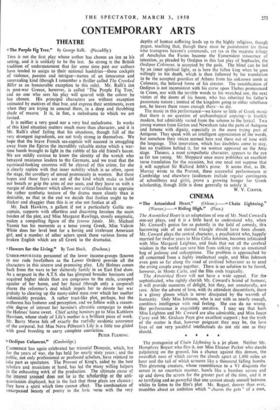CONTEMPORARY ARTS
THEATRE
"The Purple Fig Tree." By George Rail. (Piccadilly.) THIS is not the first play whose author has chosen an inn as his setting, and it is unlikely to be the last. So strong is the British tradition of understatement that for some time past our authors have tended to assign to their national hostelries—those cockpits of violence, passion and intrigue—names of an innocuous and unrevealing kind (though I remember a thriller called The Crooked Billet as an honourable exception to this rule). Mr. Ralli's inn in post-war Greece, however, is called 'The Purple Fig Tree,' and no one who sees his play will quarrel with the colour he has chosen. His principal characters are without exception animated by motives of that hue, and express their sentiments, even when they are trying to conceal them, in a deep and throbbing shade of mauve. It is, in fine, a melodrama to which we are invited.
It is neither a very good nor a very bad melodrama. In works of this kind situation matters much more than character, and it is Mr. Ralli's chief failing that his situations, though full of the very strongest ingredients, are not truly strong in themselves. We hope that the brave French sea-captain will succeed in smuggling away from the Epirus the incredibly valuable statue which a war- time bomb brought to light in the rubble of his old friend's house. We are mildly curious to know the identity of the wretch who betrayed resistance leaders to the Germans, and we trust that the equivocal-looking countess will be cleared of this crime, for she is clearly replete with that inner nobility which is so often, upon the stage, the corollary of sexual promiscuity in women. But these hopes and these fears are not of the kind which make us hold our breath or grip the arms of our seats, and they leave us with a margin of detachment which allows our critical faculties to appraise the rather synthetic texture of the drama more closely than is desirable, so that in the end we decide that fustian ought to be thicker and shaggier than this is or else not fustian at all Mr. Jack Hawkins, a gallant if not a particularly Gallic sea- captain, supports with effortless and disarming heroism the main burden of the plot, and Miss Margaret Rawlings, stonily enigmatic, makes a compelling figure of the femme fatale. Mr. Michael Yannis has his moments as a tense young Greek, Miss Valerie White does her level best for a boring and irrelevant American girl, and a number of other actors speak those various forms of broken English which are all Greek to the dramatist,


































 Previous page
Previous page